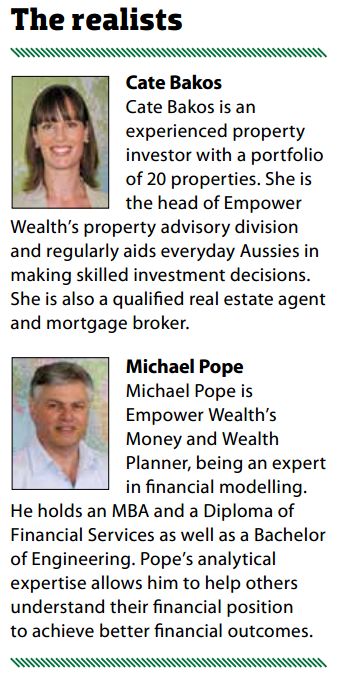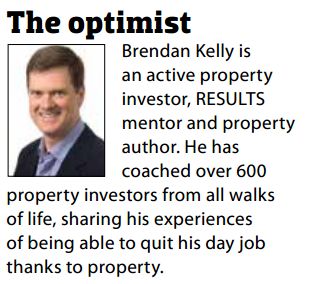If only we could all have been that disciplined.
- Our investor, who we’ll call Joshua, has an annual income of $70,000
- He has $30,000 in savings
- He is willing to invest in any low-risk housing market around Australia
- He is willing to use any strategy, so long as it does not incorporate:
- buying in a mining town
- changing jobs for the sake of strategy
- living in a different city
- Joshua currently owns no properties
- He is a renter paying$350 per week
- He has nodependants and no debt

- Solve problem of investor’s limited savings by buying property with loans at 95% of each property’s value Aid investor’s limited ability to service multiple loans on $70,000 salary by purchasing properties with strong cash flow potential, as well as promise of capital growth
- Investor should seek to limit his expenses by moving in with his parents (if possible),or scale his accommodation choices down by renting something cheaper
- With each purchase, investor uses a combination of savings and equity to put together 5% deposits on properties
- Strategy relies on our investor having a keen eye for finding outperforming properties. Some of the yields necessary to support this strategy will not be possible in ‘safe’ urban areas, unless the investor looks for truly exceptional investment properties
- He does not have adequate savings to buy a large number of cash flow positive properties in a short space of time, based on lending requirements.
- His income limits him from accruing higher growth (and hence higher negative cash flow) properties. Things that could improve Joshua’ssituation would be if he was able to live at home with his parents or, if that is not an option, pay considerably less rent. In a major capital city, he could potentially live in a house share or select a cheaper one-bedroom unit to bring his rental payments down. He could also seek to earn a higher income, either through a variation to his role or by seeking out a second job. There is also always the option of partnering with another income earner in his investment.
- The market value of property investment assets is assumed to increase at the rate of 7% per year
- Costs incurred in the purchase of any new properties (stamp duty, conveyancing fees, etc.) are assumed to be 5% of the purchase price
- Rental income from property assets is assumed to be 4% of the estimated market value of the property, and is assumed to increase in line with the market value of the property
- Properties are assumed to be occupied and providing rental income 90% of the time (with an occupancy rate of 90%)
- Property management fees are assumed to be 7.7% of the gross rental income (including GST)
- Costs associated with the property (including rates, insurance, maintenance, etc.) are assumed to be 1.5% of the estimated market value of the property at the time of purchase, and are assumed to increase at a rate of 3% per year
- Any new loans required to fund the purchase of a property are assumed to be interest only,and the interest rate is assumed to be 7.25%pa**
- No allowance has been made for the cost of Lender’s Mortgage Insurance
- No allowance has been included for any potential tax deductions that may be available for depreciation expenses
- Unless specified otherwise, it is assumed that the costs of investing in property (including the interest on any money borrowed to fund the purchase) are deductible against other taxable income and will be applied at the investor’s marginal tax rate

- Live in every property purchased to reduce rental expenses and holding costs
- Renovate first property and sell it for a profit
- Use enlarged funds to purchase a larger property and sell for a profit once again after a cheap cosmetic renovation
- Initiate a third project, this time renovating a house on a large block, while subdividing the property. Sell renovated house and newly split block for a profit
- Repeat process for fourth, fifth, sixth and seventh properties, adding the construction of units to the subdivision process to increase profits
- With close to $1.5m in the bank, use considerable pool of funds to purchase blue-chip real estate with high yields
- Quit job and live off substantial passive income
- Strategy: Buy unit to live in, renovate and then sell
- Starting funds:$30,000
- Type: 2–3-bedroom unit in capital city investor lives in
- Features:1–2 bathrooms, part of a smaller complex of 3–6 units
- Strategy: Buy small house, live in it, renovate and sell
- Funds available: $84,028
- Type: 2–3-bedroom small house in capital city investor lives in
- Features: 1–2 bathrooms
- Strategy: Buy small house on large block, live in it while subdividing and renovating it,and eventually sell
- Funds available: $144,833
- Type: 2–3-bedroom
- Features: Large blockofat least 750sqm; 1–2 bathrooms
- Strategy: Buy small house on larger block, live in it, and subdivide it this time into three properties, also renovating before selling. Repeat processfor Property 5, simply with bigger numbers, and add a development aspect to Property 6
- Funds available: $252,587
- Type: 3-bedroom houses
- Features:2 bathrooms;large blockof at least 1,200sqm
- Type:3-bedroom house
- Features: 2 bathrooms;large blockof at least 1,200 sqm
- Type: 3-bedroom house
- Features: Large blockof at least 1,200sqm The numbersFrom settlement to settlement this deal will run for 18 months.
- Strategy:Buy small house on larger block, move in once more, subdivide into three properties, and renovate the existing dwelling while constructing two more units and selling
- Funds available: $1,034,115
- Type: 3-bedroom house
- Features: 2 bathrooms; large block of at least 1,200sqm
